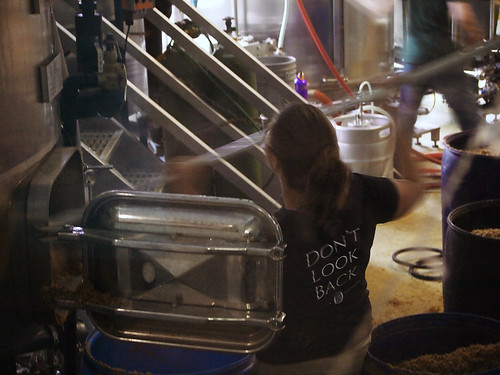Mashing is the term given to the start of the brewing process, where crushed grains are mixed with water to form a porridge-like mixture called the "mash." It is in the mash that the [barley] malt and other cereal starches are transformed into sugars and proteins and other materials made soluble, creating the sweet fermentable liquid called wort.— The Oxford Companion to Beer: Oxford University Press, 2012.
Spent grain is the compact waste of malt and/or grains left after mashing and lautering in the brewhouse. [...] Spent grain consists primarily of barley husks, protein, and minerals. [...] What is waste to the brewer is valuable to the farmer; because of its many nutrients, spent grain is an excellent animal feed. [...] In many small breweries and brewpubs, "digging out the mash tun" is a vigorous daily ritual carried out with a shovel, a welcome portent to the end of the workday.
Above, brewster Miranda Dohrman is digging out the mash at Orpheus Brewing, in Atlanta, Georgia. It's sweaty work, but there's beer at the end of the day. When she's not in the brewhouse, Ms. Dohrman arranges things as the brewery's Event Coordinator.
The photo is out-of-focus —I took it through the glass pane separating Orpheus' brewing facilities from its busy-Saturday-afternoon taproom— but you (ahem) get the picture. 19 March 2016.
-----more-----
- USA Today has selected Orpheus Brewing (which opened in 2014) as one of the nation's top ten new 'craft' breweries.
- More photos of the brewery: here.
- * Brewster: a female brewer (or would that be that "brewer" is a male brewster), or ...
In northern M(iddle) E(nglish), perh. owing to the frequent adoption by men of trades like weaving, baking, tailoring, etc., the suffix [-ster] came very early to be used, indiscriminately with -ER, as an agential ending irrespective of gender…
—Martyn Cornell, quoting from the Oxford English Dictionary, at Zythophile.
It is probable that “-ster” was often preferred to “-er” as more unambiguously referring to the holder of a professional function, as distinguished from the doer of an occasional act. In Scotland, baxter and webster [weaver] survived as masculines down to the 19th c. …
In the south the suffix continued to be predominantly feminine throughout the M(iddle) E(nglish) period. The Old English formations, baxter, seamster, tapster, were in southern English usually feminine before 1500 … also spinster, which alone of the group has survived (though with change of sense) solely as a feminine. - Pic(k) of the Week: one in a weekly series of personal photos, usually posted on Saturdays, and often, but not always, with a good fermentable as the subject. Camera: Olympus Pen E-PL1.
- Commercial reproduction requires explicit permission, as per Creative Commons.
- For more from YFGF:
- Follow on Twitter: @Cizauskas.
- Like on Facebook: YoursForGoodFermentables.
- Follow on Flickr: Cizauskas.
- Follow on Instagram: @tcizauskas.











No comments:
Post a Comment
Comment here ...